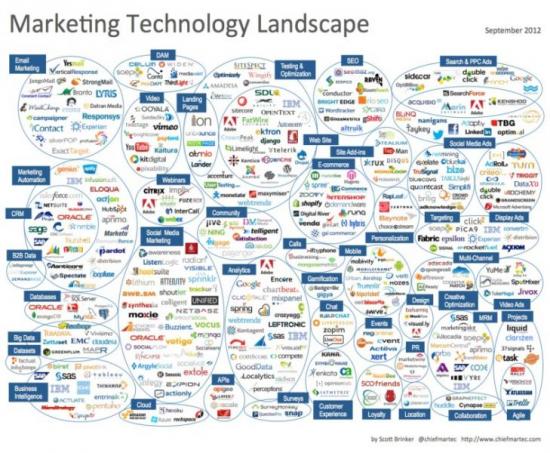Savvy CMOs Must Steer Their Marketing Technology Decisions In The Right Direction
When I first became a marketing executive responsible for leading a team, life was simple. All we needed to worry about was having a solid marketing strategy and then doing a good job of executing against it with engaging creative and the right offer. In those days, technology was someone else’s concern. The most we worried about was the condition of the direct marketing file or rented list and the percentage of responses we were able to get. Pretty easy, right?
Fast-forward to today and that simple life is a thing of the past. The digital revolution has forever changed the balance of power, putting customers in charge. Marketers live in a brave new world where customer understanding and the ability to provide value to customers in their buying journey across the exploding number of engagement channels are now the name of the game. And now technology is everywhere touching all of these aspects of marketing and more.
Over the past few weeks, I’ve been honored to speak at NYC Internet Week’s Cardinal Path and Google's Building a Data-Driven Culture opening panel and the Ad Age Marketing + Technology Summit; as well as at several Forrester client events in the US and Europe on the topic of marketing technology and the CMO role in the strategy development, vendor selection, and execution process. And one thing that I stressed across all of the discussions at these events is this — CMOs must accept that it’s no longer possible to run the business of marketing without technology. Technology is now necessary to help your marketing team handle the external fragmentation and internal data sources that drive decisions and results.
In today’s post-digital world, technology has become the lens through which you should view your relationships with your customers. Your marketing team cannot be at its best unless it excels at understanding and using the right technology the right way for the right results.
What does this mean to you as a CMO?
Whether you’re ready or not, you’ve now become a technologist. In fact, according to a survey published in November of 2012 by the Economist Intelligence Unit, one in five CEOs believe that technology understanding and technical expertise is a top-three skill for CMOs to have. Why is this skill so important?
It’s virtually impossible to manage the plethora of customer touchpoints and channels across the buying journey, develop data-based insights into customer behavior, manage your message effectively, and most importantly measure the ROI of all of your marketing investments without technology. Implemented well, marketing technology can provide the foundation you need to deliver the consistent customer engagement that empowered buyers demand across their life cycle. As a CMO, success in today’s data-driven, customer-centered, automated world, it’s not a question of whether technology plays a role in marketing; it’s what role you’ll need to play in building the right technology infrastructure to drive your marketing success.
Seems pretty straight forward. But the marketing technology choices in front of you are abundant and confusing and seem to expand each and every day. This graphic from Scott Brinker’s Chief Marketing Technologist Blog is one of the best ways I’ve seen to simply show the complexity of the marketing technology choices you face:

With this much complexity, it’s no surprise that many CMOs are ill-equipped to provide the vision and strategic direction required to make sound and effective marketing technology purchase decisions.
And that’s where my new report, “The CMO’s Role In Technology Purchasing: How CMOs Should Plan For Technology Investments” (subscription required), can help you define your role and make the right decisions. Here’s how to crack the code and make marketing technology work for you:
- Use technology wisely to run marketing like a business. As a CMO, you need a marketing technology strategy based on business objectives — where technology can be an enabler of your process and strategy. With an integrated marketing technology infrastructure, you can pull together disparate data, customer input, responses, and campaign results from various systems and tell a concise and easily understood story on the ROI of your efforts.
- Build the right marketing technology strategy for you and your company. While you may have used technology in parts of your organization, it’s time to consolidate all of your efforts into a concise, customer relevant strategy. My new report will help you answer key questions to build a strategy that works for you: How do I align the right technology to the buyer’s journey to deliver the right message to the right customer at the right time, and should I focus my technology investments on customer-facing, customer engagement, marketing operations, or measurement and analytic technology? These are important questions and ones a future-savvy CMO can’t afford to overlook.
- Define your role. Not all CMOs are comfortable with technology or ready to tackle the challenge of defining and implementing the right technology for their business. As a C-suite executive, the onus is on you to define your long-term role as a technological visionary for your enterprise and how you want to engage in the marketing technology road map creation and vendor selection process. Take Forrester’s marketing technology skill assessment (subscription required) to analyze your skills along the important dimensions of strategy, process, technology, and measurement and analytics — all critical components to your success. Define the skills you have, what skills you need to build, and get started now.
- Identify how to work effectively with your CIO. In previous blog posts, I’ve shared my views on how to develop a blueprint to improve your relationship with your CIO. You and your CIO need to have alignment on a joint vision for customers and a focus on them. Those CMOs who choose to ignore this and go it alone do so at their own peril. They miss key integration points, don’t achieve the desired benefits from their technology investments, and allow the technology to dictate their strategy and marketing processes.
Technology use in marketing is here to stay, entwined together forever. It’s time for CMOs to understand how technology fits into the new marketing equation and lead efforts to implement the right technology solution for their organizations. And it’s also time for CMOs to build and maintain a strong relationship with their CIO to lead this charge. At the end of the day, CMOs must achieve their marketing objectives, grow the business, and improve customer experience. And when it comes to that, technology is the key to the kingdom.
Do you have a marketing technology strategy? Are you making the right technology decisions? What role are you playing in marketing technology purchases?
I’d love to hear your comments and perspectives about this topic. Please reach out to me at via email, on my blog, or on my Twitter account with your thoughts.
